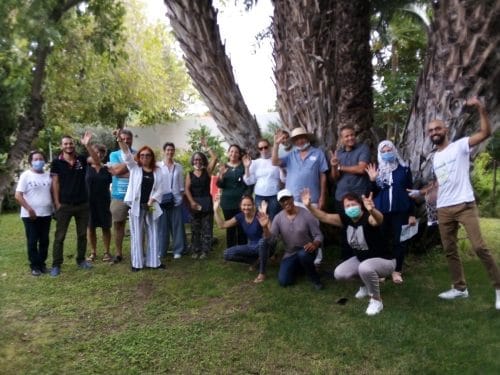Third technical visit: The rebirth of an Andalusian nourishing garden
In the heart of the Medina of Tunis, a paradisiacal garden is born and a new mini ecosystem is well established. On 25 September 2020, REACT organised the third technical visit of a Tunisian ECS. The members of our network of edible and sustainable cities had the opportunity to discover this restored Andalusian nourishing garden which allowed us to dream of a Medina with an edible future. The story of the genesis of this garden was passionately told to us by our hosts Mr Henri and Ms Marie Anne. By looking at the photos of the site at the beginning, we became aware of the enormous amount of work that has been carried out to set up this magnificent garden, which we salute.
On a surface of 2000m² cultivated organically, the garden, in the heart of the medina, ensures its nourishing vocation thanks to the multitude of fruit trees; citrus fruits, vines, palm and olive trees, banana trees and others, a vegetable garden as well as medicinal plants. A henhouse also finds its place in this garden. Two swarms of wild bees play their natural role as pollinators and indicators of the health of this garden. Our guests also recycle bio-waste by making compost, which is highly appreciated by neighbours and other interested parties.
Everything is in harmony and all surfaces including roofs and terraces are integrated. An imposing and welldesigned green wall isolates this garden from its outside environment and creates an atmosphere of peace.
This nourishing garden has created a new ecosystem where several species of birds have found refuge. For two hours, our hosts and the sixteen participants from various disciplines (landscape gardener, architect, botanist, agronomist, practitioners, pedologist, horticulturist, etc.) explored this garden, sharing its history, vision, design, biodiversity, practices and future goals. In the hope of succeeding in cloning this wonderful experience among the neighbourhood and in other places in the city of Tunis, representatives of the Commune of Tunis joined us during this visit with enthusiasm.



